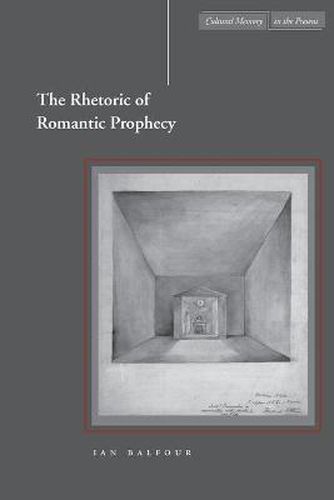Readings Newsletter
Become a Readings Member to make your shopping experience even easier.
Sign in or sign up for free!
You’re not far away from qualifying for FREE standard shipping within Australia
You’ve qualified for FREE standard shipping within Australia
The cart is loading…






The Romantic era in England and Germany saw a sudden renewal of prophetic modes of writing. Biblical prophecy and, to a lesser extent, classical oracle again became viable models for poetry and even for journalistic prose. Notably, this development arose out of the new-found freedom of biblical interpretation that began in the mid-eighteenth century, as the Bible was increasingly seen to be a literary and mythical text.
Taking Walter Benjamin’s thinking about history as a point of departure, the author shows how the model for Romantic prophecy emerges less as a prediction of the future than as a call to change in the present, even as it quotes, at key turns, texts from the past. After surveying developments in eighteenth-century biblical hermeneutics, as well as the numerous instances of prophetic eruption in Romantic poetry, the book culminates in close readings of works by Blake, Hoelderlin, and Coleridge.
Each of these writers interpreted the Bible in strong, variously radical and conservative ways, and each reworked prophetic texts in often startling fashion. The author’s reading of Blake focuses on the complex temporal and rhetorical dynamics at work in a prophetic tradition, with attention paid to the key mediating figure of Milton. The chapter on Hoelderlin investigates the truth-claim of poetry and the consequences of Hoelderlin’s insight into the necessarily figural character of poetry. The analysis of Coleridge correlates his theory of allegory and symbol with his theory and practice of political writing, which often relies on mobilizing prophetic authority. Together, the readings force us to reexamine the claims and practices of Romantic poets and thinkers and their ideas and ideologies, not without engendering some allegorical resonance with issues in our own time.
$9.00 standard shipping within Australia
FREE standard shipping within Australia for orders over $100.00
Express & International shipping calculated at checkout
The Romantic era in England and Germany saw a sudden renewal of prophetic modes of writing. Biblical prophecy and, to a lesser extent, classical oracle again became viable models for poetry and even for journalistic prose. Notably, this development arose out of the new-found freedom of biblical interpretation that began in the mid-eighteenth century, as the Bible was increasingly seen to be a literary and mythical text.
Taking Walter Benjamin’s thinking about history as a point of departure, the author shows how the model for Romantic prophecy emerges less as a prediction of the future than as a call to change in the present, even as it quotes, at key turns, texts from the past. After surveying developments in eighteenth-century biblical hermeneutics, as well as the numerous instances of prophetic eruption in Romantic poetry, the book culminates in close readings of works by Blake, Hoelderlin, and Coleridge.
Each of these writers interpreted the Bible in strong, variously radical and conservative ways, and each reworked prophetic texts in often startling fashion. The author’s reading of Blake focuses on the complex temporal and rhetorical dynamics at work in a prophetic tradition, with attention paid to the key mediating figure of Milton. The chapter on Hoelderlin investigates the truth-claim of poetry and the consequences of Hoelderlin’s insight into the necessarily figural character of poetry. The analysis of Coleridge correlates his theory of allegory and symbol with his theory and practice of political writing, which often relies on mobilizing prophetic authority. Together, the readings force us to reexamine the claims and practices of Romantic poets and thinkers and their ideas and ideologies, not without engendering some allegorical resonance with issues in our own time.